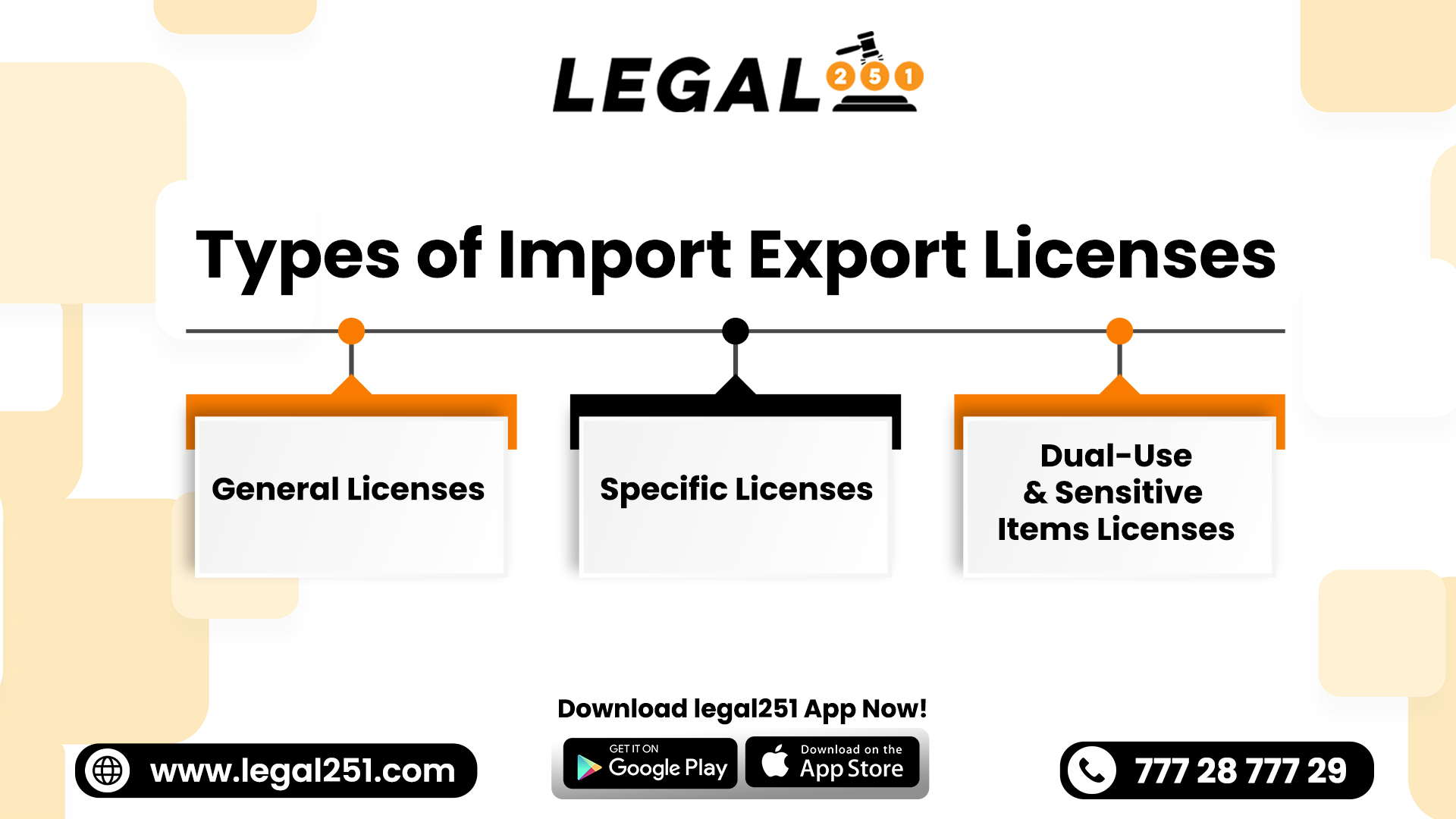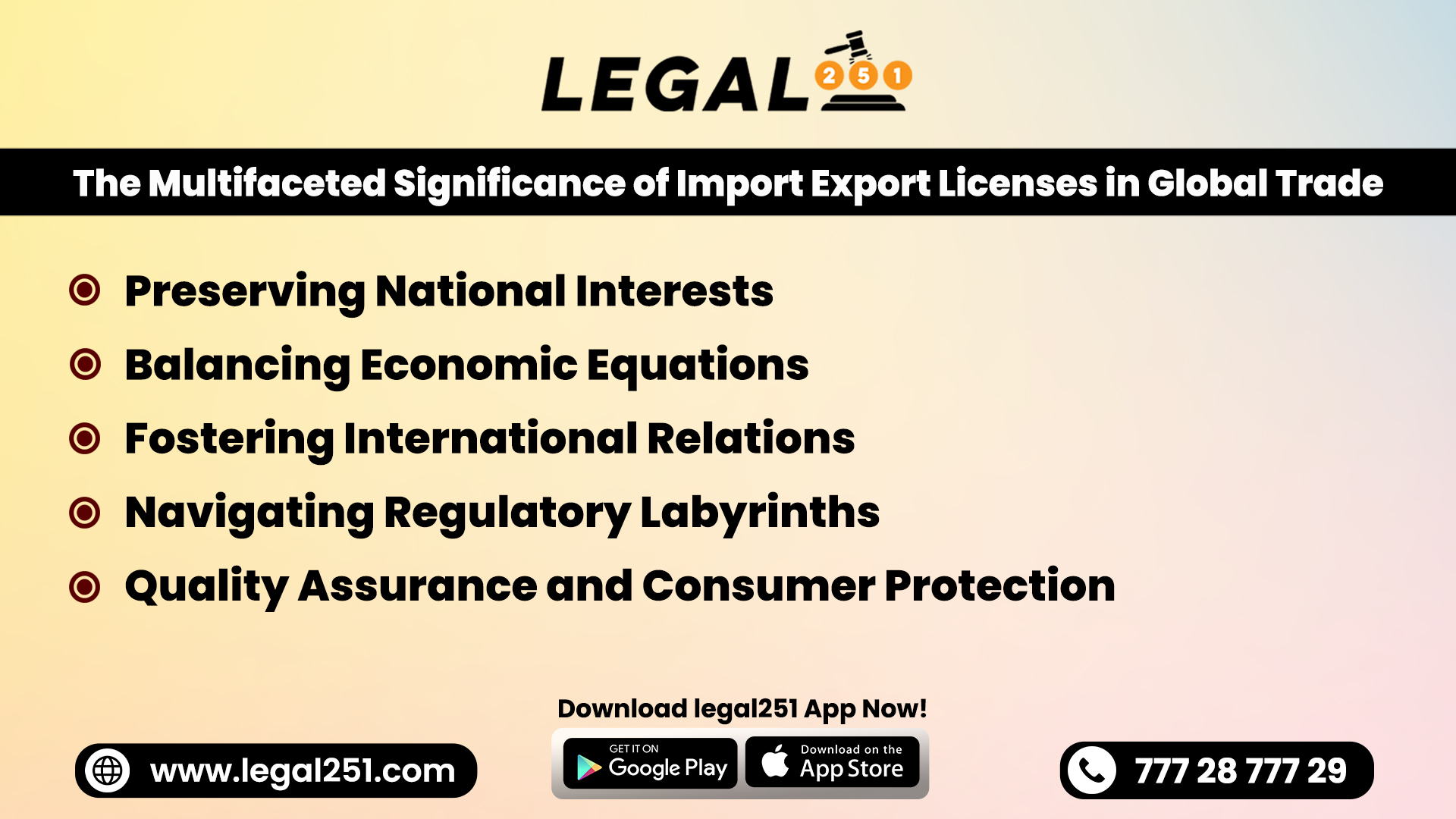In today’s interconnected world, international trade forms the backbone of economic growth and development. Businesses, both large and small, are increasingly looking beyond their domestic markets to explore opportunities on a global scale. The modern world is a tapestry of interconnected economies, with goods flowing seamlessly across borders, contributing to nations’ prosperity and societies’ advancement. This intricate dance of international trade involves many players, each playing a crucial role in the movement of goods. At the heart of this elaborate mechanism lies the import-export license – a key that unlocks the doors to the global market. However, diving into the realm of import and export requires adherence to regulatory frameworks, and a crucial aspect of this is obtaining the necessary import-export licenses.
Understanding Import Export Licenses:
Import and export licenses are legal permits issued by governments to enable businesses to engage in cross-border trade. These licenses are essential for maintaining control over the movement of goods across borders and ensuring compliance with various laws and regulations.
An import-export license is more than a mere permit; it represents a commitment to responsible global trade. These licenses are legal authorizations issued by governments to individuals and businesses, allowing them to participate in the exchange of goods across international market. They are not just administrative formalities but instruments of control, ensuring that the wheels of trade turn smoothly while adhering to regulatory frameworks.
The Significance of Import Export Licenses:
1. Regulatory Compliance: Import-export licenses ensure businesses comply with international trade regulations, export controls, and economic sanctions. This safeguards against illegal trade activities and protects national security interests.
2. Quality Control: Governments often use import-export licenses to regulate the quality and safety of goods entering or leaving a country. This helps in maintaining the standards of imported goods and protecting consumers.
3. Revenue Collection: Import and export duties contribute significantly to a country’s revenue. Licenses aid in accurate duty assessment, preventing revenue loss due to underreporting or misclassifying goods.
4. Market Access: Many foreign countries restrict certain goods to protect local industries. Import-export licenses provide insight into which products can be traded freely and which are subject to restrictions.
5. Data Collection: Licensing systems enable governments to gather data on trade flows, which assists in economic planning, export policy formulation, and statistical analysis.
Types of Import Export Licenses:
1. General Licenses: These licenses cover a broad category of goods and are typically granted to businesses that meet specific criteria, such as having a clean compliance record.
2. Specific Licenses: Specific licenses are required for goods subject to stricter regulations. These may involve additional scrutiny, documentation, and approvals.
3. Dual-Use and Sensitive Items Licenses: Certain goods, or dual-use items, have civilian and military applications. Exporting such items demands specialized licenses due to their potential security risks.
Application Process:
1. Research and Preparation: Businesses must identify the licenses relevant to their products and destination countries. They should gather all mandatory documents, including product descriptions, value, quantity, and end-use details.
2. License Application Submission: This involves filling out application forms accurately and submitting them with the required documents. The relevant government agency then reviews the application.
3. Review and Approval: Government agencies assess applications to ensure they comply with regulations. This step may involve background checks and verifying the accuracy of the information provided.
4. Issuance of License: The government issues the import-export license upon approval. It contains essential details such as license number, validity period, authorized goods, and special conditions.
Challenges and Considerations:
1. Complex Regulations: Navigating the intricacies of international trade regulations can be overwhelming. Engaging with trade consultants or legal experts can mitigate the risks of non-compliance.
2. Changing Policies: Import-export regulations are subject to change due to shifts in international relations, economic policies, and geopolitical factors. Businesses must stay informed to adapt swiftly.
3. Documentation Accuracy: Errors in license online application or supporting documents can lead to delays or rejections. Attention to detail is crucial to ensure a smooth process.
4. Costs and Fees: Obtaining licenses may involve various application fees, which businesses should factor into their trade costs. Moreover, delays in license processing can impact supply chain timelines.
The Multifaceted Significance of Import Export Licenses in Global Trade:
- Navigating Regulatory Labyrinths: International trade is subject to a labyrinth of regulations, ranging from customs procedures to international sanctions. Import-export licenses act as guiding lights, helping export business navigate these intricate pathways. By ensuring compliance with diverse legal requirements, these licenses prevent trade disruptions and foster a climate of transparency and trust.
- Preserving National Interests: Governments safeguard their national interests through import-export licenses. These permits allow authorities to oversee the movement of sensitive goods that could impact national security or local industries adversely. By exercising control over these items, countries strike a balance between global trade and domestic concerns.
- Balancing Economic Equations: Import-export licenses play a pivotal role in maintaining equilibrium in a country’s economy. They enable governments to impose tariffs and duties on imported goods, generating revenue that can be channelled into public services and infrastructure development. Conversely, these licenses also facilitate exports, promoting economic growth by accessing foreign markets.
- Quality Assurance and Consumer Protection: Quality and safety are paramount in the global marketplace. Import-export licenses empower governments to enforce stringent standards on incoming goods. This safeguards local consumers from substandard or unsafe products and fosters a reputation for reliability in international trade relationships.
- Fostering International Relations: Global trade is a cornerstone of diplomacy, promoting cooperation and understanding among nations. Import-export licenses play a role here, too, as they reflect a commitment to fair trade practices. By adhering to these practices, countries build mutual trust and contribute to the stability of the international trading system.
Import Export License Categories: A Spectrum of Control:
- General Licenses: These encompass a broad range of goods and are often granted to entities with a track record of compliance. They expedite the movement of commonly traded items, facilitating smoother trade flows.
- Specific Licenses: For goods that require closer scrutiny due to their nature or end-use, particular licenses are indispensable. These licenses involve a more comprehensive evaluation of the product and its intended purpose.
- Dual-Use and Sensitive Items Licenses: In technology and defence, dual-use items – those with civilian and military applications – necessitate specialized licenses. These licenses reflect the delicate balance between technological progress and security concerns.
The Voyage of Application: From Preparation to Approval
- Preparation: The journey begins with meticulous preparation. Businesses research the licenses applicable to their products and destinations, gathering a treasure trove of documentation, from product descriptions to end-use justifications.
- Submission: The application submission marks a crucial juncture—accurate completion of forms and attachment of required documents set the stage for the subsequent evaluation.
- Review and Scrutiny: Government agencies undertake a meticulous review import process. This involves delving into the details, from assessing the accuracy of information to ensuring compliance with international regulations.
- Issuance: With the nod of approval, the import-export license is issued. It’s a ticket to the global marketplace, bearing vital details such as the license number, validity period, and authorized goods.
Global Trade Challenges: An Uncharted Terrain:
- Dynamic Regulatory Landscape: The global trade arena constantly evolves, influenced by geopolitical shifts and economic dynamics. Import-export licenses must adapt to these changes, requiring businesses to stay agile and well-informed.
- Technological Prowess: In the digital age, trade has transcended physical borders. E-commerce and digital services complicate the import-export license landscape, demanding updated frameworks to address intangible export transactions.
- Sustainability Imperative: With sustainability at the forefront, the import-export landscape is witnessing increased scrutiny on environmentally sensitive goods. Licenses must evolve to encompass eco-friendly practices and sustainable trade.
- Supply Chain Resilience: Recent disruptions highlighted the fragility of global supply chains. Import-export licenses must now incorporate contingencies for unforeseen events, ensuring trade resilience.
Conclusion:
In the globalized business landscape, import-export licenses are indispensable in facilitating cross-border trade while upholding legal and regulatory standards. These licenses serve as a safeguard against illicit activities and contribute to revenue generation and economic planning. To successfully navigate the complexities of international trade, businesses must grasp the significance of these licenses, understand the intricacies of their application processes, and stay attuned to evolving regulations.
By doing so, they can unlock the potential of the global market and propel their growth internationally. They are the linchpin that harmonizes diverse economies and ensures responsible commerce. These licenses encapsulate a commitment to legality, transparency, and adherence to international norms. As businesses continue to seize the opportunities of a borderless marketplace, the import-export license stands as the sentinel of integrity, safeguarding nations’ interests and fostering a world where commerce knows no bounds.
The Legal251 experienced team of specialists will guide you through each step to ensure accurate and swift execution. Download our App, Legal251 or visit our website, www.legal251.com or dial the toll-free number – (+91) 77728-77729.
































